That’s how conference producer and host Phil Wolf, CEO of PhocusWright, described this next session at the the Travel 2.0 conference. He said it was one of the sessions he was most looking forward to, and also said it could be called “reverse yield management,” which I found fascinating. No doubt about it, Web 2.0 and Travel 2.0 fans, airfare search has entered a whole new phase.
One of the main reasons I trekked to Hollywood this week to cover the conference was to hear Minneapolis-based Flyspy do its first sneak-peak pitch — a limited coming-out, as it were, within its chosen vertical. 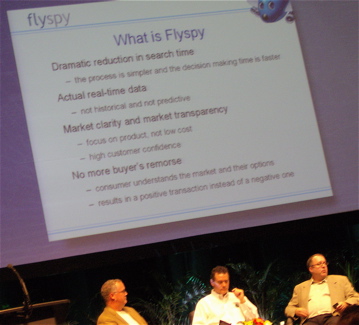 Robert Metcalf, the founder and visionary behind chart-based Flyspy, was invited a few weeks ago by the event’s producers to introduce his service at this high-profile annual gathering of online and traditional travel execs. He told me he had to think about it for a while, but ultimately decided, even though it’s still early (the site isn’t quite in full beta release yet), that it was just too tempting an opportunity to miss — to get the kind of reaction he could get here.
Robert Metcalf, the founder and visionary behind chart-based Flyspy, was invited a few weeks ago by the event’s producers to introduce his service at this high-profile annual gathering of online and traditional travel execs. He told me he had to think about it for a while, but ultimately decided, even though it’s still early (the site isn’t quite in full beta release yet), that it was just too tempting an opportunity to miss — to get the kind of reaction he could get here.
Robert Metcalf is a very experienced software architect and developer of complex web sites. [He’s shown on the right in the onstage photo.] He describes Flyspy, which he’s been planning and developing very quietly for almost three years now, as the hardest problem he’s ever tackled. “The way airfare data works, it’s just a very, very complex system. When I got into it, I couldn’t believe it.” But now he feels all the hard work is paying off. He describes Flyspy as an “intelligent, at-a-glance airfare search engine.” [See sample Flyspy chart, which illustrates the frequent peaks and valleys of airline pricing, and just how volatile certain routes can be.] He said his main benefit is a “dramatic reduction in fare search time” because of his unique charting approach. The site provides actual, real-time flight data, not historical or predictive data as two other well-funded startups do (and to whom he says he’s often erroneously compared). That would be FareCompare and Farecast, respectively — firms that were also invited to speak in this session (though mysteriously the latter didn’t show). Another key difference I learned with these two sites compared to Flyspy: you can’t actually book a ticket at either.
Though in limited alpha mode, Flyspy has already been discovered and reported on this year by TechCrunch, Wired.com, and Fast Company, and others, and I’ve written about it here previously myself. “It just seems to resonate with people,” says Robert. You can find links to previous coverage at Flypsy’s “About” page.
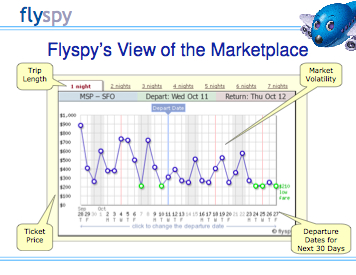
Robert says that Flyspy’s approach provides “market clarity and market transparency,” resulting in “high customer confidence.” What he’s learned from a significant amount of feedback he’s already received from his site’s users is that searching and booking on Flyspy eliminates buyer’s remorse. “We allow the consumer to really understand the market for trips they’re planning and their various options. And that results in a positive transaction instead of a negative one.” In other words, it takes away that nagging, uncertain feeling we’ve all had: “If only I’d had more time to search, I know I could’ve found a better fare.” Time is the valuable commodity today, and Flyspy addresses that consumer need head-on, he says.
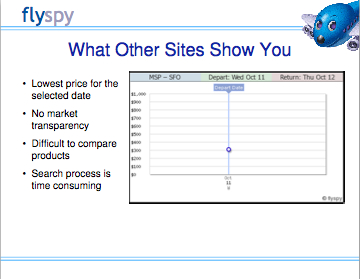
Flyspy’s Value Proposition
In his presentation, Metcalf said decision-making time is much faster and search much simpler with Flyspy than with all the other sites — whether you’re comparing to the old-line “Travel 1.0” sites (often called The Big Three), the airline sites themselves, or the newer so-called Travel 1.5 “meta search” sites. I guess that makes Flyspy a genuine Travel 2.0-era search site. Metcalf said Flyspy requires only one search, not many, to get the full picture — which is a major time differential. The number of data points on one of his charts would require 240 searches elsewhere. And Flyspy has the “most Google-like interface” of all the airfare search sites, he says. It’s really dead simple for the consumer.
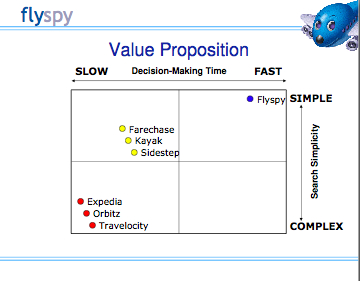
Partners Lining Up Before Launch
Toward the end of his talk, Metcalf took the opportunity to announce that Flyspy has several partnerships in place, even before the company officially launches. Well, he didn’t actually name who they are — just hinted broadly. These strategic relationships include:
1) A leading business magazine, where Flyspy will be a regular feature in the travel section of their web site
2) A frequent flyer web site with 15 million page views/month
3) A leading blog platform with 50,000 blogs and 18 million visitors/month
4) A leading online CRM solution with 500,000 users, where Flyspy will be the sole travel partner
5) A major daily newspaper (circulation 600,000) wherein Flyspy charts will be featured weekly
6) An industry publication with a monthly circulation of 80,000
After this session, I grabbed a shot of airline pricing transparency expert Nelson Granados (left) with Robert Metcalf. Nelson is an associate professor at Pepperdine University, where Flyspy is a case study this semester in two of his MBA classes. He previously held a similar position at the Carlson School of Management at the University of Minnesota, and has also worked for Northwest Airlines.
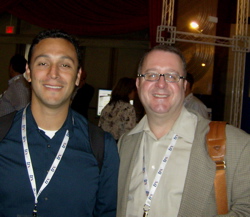
In my interview with Robert Metcalf at lunch following the session, I learned he was approached at the conference by several firms that are interested in licensing Flyspy’s data, and also by at least one major, brand-name site that would like to feature Flyspy as its exclusive airfare search partner. “I’m very glad I came to the event,” he said. “I met a lot of great contacts and intend to follow up.”
Watch for another post soon recapping this high-energy conference. As I learned here, travel is the world’s largest industry. But the latest iteration of the Internet seems to be breathing new fire into it…
Tags: online travel, PhocusWright, Travel 2.0, Web 2.0, Flyspy, Robert Metcalf, Minneapolis, airfare search
 Okay, are you ready for it? Are you sure? Okay, drumroll, it’s…..“Search, Ads & Apps” !! No, I’m not kidding — that is it, friends. I know this really tugs on your emotions. But, please, try to control yourselves … from tearing up with brand euphoria.
Okay, are you ready for it? Are you sure? Okay, drumroll, it’s…..“Search, Ads & Apps” !! No, I’m not kidding — that is it, friends. I know this really tugs on your emotions. But, please, try to control yourselves … from tearing up with brand euphoria.
 Lots of great questions and input from several people. I’m convinced that promoting Minnebar on the GetGo site contributed to the record attendance. The biggest turnout yet for a BarCamp in this country! Yeeeee-haww!!!
Lots of great questions and input from several people. I’m convinced that promoting Minnebar on the GetGo site contributed to the record attendance. The biggest turnout yet for a BarCamp in this country! Yeeeee-haww!!! Photo: Beers on the roof with event sponsors John Roberts (left) and Harold Slawik (right) of New Counsel plc, and Bill McLeslie of ipHouse. The event wi-fi was awesome — Bill hooked us up with 7 megabits of bandwidth. Gorgeous day in the Twin Cities — the high hit 83 F!
Photo: Beers on the roof with event sponsors John Roberts (left) and Harold Slawik (right) of New Counsel plc, and Bill McLeslie of ipHouse. The event wi-fi was awesome — Bill hooked us up with 7 megabits of bandwidth. Gorgeous day in the Twin Cities — the high hit 83 F!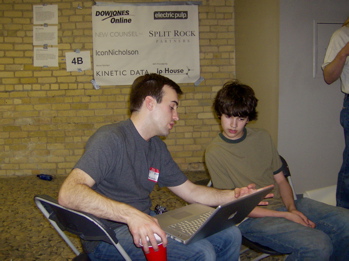 My favorite photo at the event: We start ’em young here in MN. Matt Bauer, ace developer just recruited to MotionBox in NYC (but he didn’t have to move!), shows a developer-in-training how it’s done. Matt had just finished his session on Adobe Flex.
My favorite photo at the event: We start ’em young here in MN. Matt Bauer, ace developer just recruited to MotionBox in NYC (but he didn’t have to move!), shows a developer-in-training how it’s done. Matt had just finished his session on Adobe Flex. So, take that Google! It previews the content of a web link without clicking on it — by studying the language, the linguistics, behind it. Pretty heavy stuff, but this team of developers has been working on perfecting this technology for years, so this is certainly no upstart. Perhaps they’re onto an application of it now that will stick, and that the powers-that-be will allow to happen. User acceptance will tell the story, of course, and that’s why reaction in the blogosphere will be big for these guys. Smartly, they’re opening the technology up via open source XML web services, I learned last week.
So, take that Google! It previews the content of a web link without clicking on it — by studying the language, the linguistics, behind it. Pretty heavy stuff, but this team of developers has been working on perfecting this technology for years, so this is certainly no upstart. Perhaps they’re onto an application of it now that will stick, and that the powers-that-be will allow to happen. User acceptance will tell the story, of course, and that’s why reaction in the blogosphere will be big for these guys. Smartly, they’re opening the technology up via open source XML web services, I learned last week.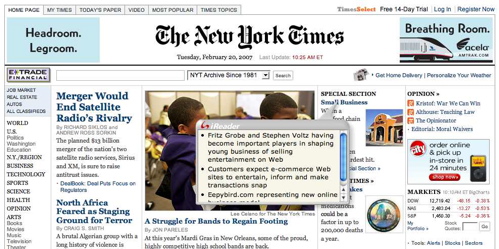

 Robert Metcalf, the founder and visionary behind chart-based Flyspy, was invited a few weeks ago by the event’s producers to introduce his service at this high-profile annual gathering of online and traditional travel execs. He told me he had to think about it for a while, but ultimately decided, even though it’s still early (the site isn’t quite in full beta release yet), that it was just too tempting an opportunity to miss — to get the kind of reaction he could get here.
Robert Metcalf, the founder and visionary behind chart-based Flyspy, was invited a few weeks ago by the event’s producers to introduce his service at this high-profile annual gathering of online and traditional travel execs. He told me he had to think about it for a while, but ultimately decided, even though it’s still early (the site isn’t quite in full beta release yet), that it was just too tempting an opportunity to miss — to get the kind of reaction he could get here. 




Recent Comments